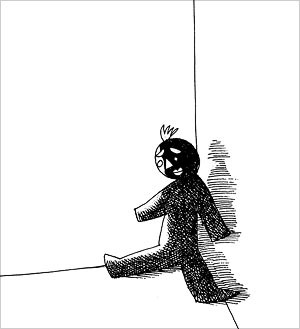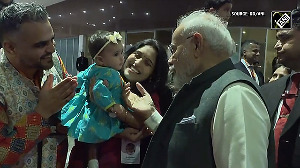
It is critical that we get past the stigma of mental illness, says Nisha Chhabra. Illustration: Uttam Ghosh
I remember how I sat at the kitchen table in December 1993 with knots in my stomach, my mother cooking dinner for my ninth birthday party. "Do you think dad is going to come out of his room during my party?" I nervously asked my mother as she pulled coconut barfi, a traditional Indian sweet, out from the fridge.
Six years earlier when I was just three years old, my father had been diagnosed with bipolar disorder, a mental illness characterised by mood instability and irregular shifts in energy and activity levels, and I never knew how he'd behave in company. On the surface, in our lives in Texas, we were the quintessential immigrant success story -- a close-knit family from India that built a prosperous life in America from a few dollars, broken English and a wealth of hope.
But behind the scenes, we were hiding a lot. We shuttled secretly to the psychiatrist and tried to cover up my father's unpredictable behaviour. Once when I was 10, we went to a dinner party at a family friend's home, and my father exploded in anger, cursing at an 'uncle' or an elder in our South Asian community. My mother quickly excused us, and we scurried out the door. We were never invited again. To this day, most of our family in India still doesn't know about my father's illness.
To me, our family's struggle with my father's bipolar disorder is the same struggle that the South Asian community faces in dealing with mental illness. But, at 25, I can now say that I am ashamed at myself -- not my father -- for the fear and ignorance with which I lived. What I have come to realise is that it is critical that, as both individuals and a community, we get past the stigma of mental illness so we can start the process of healing.
"Shame is a very powerful and painful emotion," says Rohan Ganguli, a University of Pittsburgh psychiatrist who has treated South Asian patients in the United States, Canada and his native India. "To a large extent, this is what raises the stigma against people with a mental illness. It is what makes many families deny, conceal, or hide the illness," he says. Ultimately, he warns, shame is "what causes people to remain untreated".
To him, the most effective remedy is for South Asians to have more knowledge about mental illnesses and compassion for the mentally ill. Then, people can admit they are taking medication for mental illnesses just as they would admit getting treatment for diabetes or high blood pressure. "It should not be seen as something that is anyone's fault, or a moral failing," says Ganguli. "A more open and public discussion of mental illness will lift the unnecessary additional burden of shame and also probably improve access to appropriate treatment."
For my family, it's been a long journey to get to the point of acceptance. When my father was first diagnosed, my mother says she had our family retreat from the community to protect us. "When it came to facing the society," she says, "we just started to cut ourselves off. It's not that you don't want people to know, it's just you don't want to be embarrassed."
Talking about mental illness is challenging in all parts of society. But within the South Asian community, psychiatric conditions and other misunderstood illnesses can be particularly stigmatised for cultural reasons. People sometimes attribute mental illness to jadhu thona, or black magic. Sometimes, they even say a person has fallen victim to nazar, or the evil eye. Other times, they blame curses from God or punishments for sins in a past life. According to mental health experts, in many South Asian countries, the mentally ill are often mistreated, ostracised or confined because of the shame associated with psychiatric conditions.
This stigma has led many to hide mental illnesses and other types of illnesses from the community rather than seek necessary treatment. Sonal Patel, a clinical pharmacist in Temple, Texas, said her grandparents blame her aunt's epilepsy on nazar, and most of her family does not acknowledge her disorder. "When she has a seizure, everyone just leaves the room," says Patel.
In Toronto, Canada, Lina Dhingra, an event producer and publicist, says her parents, immigrants from India, found little support in their South Asian community as they tried to handle her father's mental illness, schizo-affective disorder. "We chose not to talk about it with our relatives, not because we didn't want to, but because we found that there was resistance from them," she says. "They never reached a hand and offered to give us help. Instead, they would see my father at family gatherings, and tell their kids to stay clear of him."
Three years ago, the unthinkable happened: her mother died at her father's hands. Dhingra says their psychiatrist was not properly treating her father, and her mother died while her father was in the midst of a psychotic episode. Last year, after a two-and-a-half year legal battle that Dhingra spearheaded, the court declared her father not criminally responsible for the death of his wife due to his mental illness. From prison, he was finally released to the care of a local psychiatric treatment centre, where Dhingra visits him regularly despite the disapproval of family members. She says it is clear that her family disapproves of these visits because they have not fully accepted the fact that her father suffers from an illness. They still cannot forgive him for the death of her mother.
"An illness of the mind is very difficult to cope with, especially alone," Dhingra says. "If it's a physical, more apparent illness, people are more apt to understand. But when it's a mind matter, many close their eyes and hearts to understanding it, therefore propelling the stigma and alienation."
In recent years, some people have made efforts to build awareness, and that is a good thing. Two years ago, Rehana Mirza, a New York-based filmmaker of Pakistani and Filipina heritage produced a film, Hiding Divya, around a South Asian character who has bipolar disorder. Mirza chronicles her struggles in order to humanise the illness.
In 2001, Razia Kosi, a mental health therapist in the Maryland public school system, founded Counselors Helping South Asians and Indians, a nonprofit organisation in Baltimore, to help South Asians suffering from mental illnesses. "We feel there is a need to inform the South Asian community on mental health issues," says Swaran Dhawan, a CHAI board member and clinical social worker in Baltimore. "The only way to minimise the stigma is to educate as much as possible within the community."
Also in 2001, Aruna Rao, a local community leader in North Brunswick, New Jersey, founded the South Asian Mental Health Awareness in Jersey, a programme of the National Alliance of Mental Illness of New Jersey. It is designed to provide support, education and advocacy for South Asians affected by serious mental illnesses. She organised the group to acclimatise South Asians to discussing mental illnesses with others from their culture, helping them overcome fears of judgment and ensure they get emotional support and information about treatment resources.
"It is not uncommon for South Asians to deny their mental health issues because they want to be the model minority," says Rao. "They worry that their children's likelihood of marriage will be jeopardised or they will ruin their family image." In addition, she says, "South Asians are terrified about mental illness because it implies hopelessness. Revealing that you or a loved one has a mental illness can mean a lifetime of being ridiculed and shamed by the extended family and community."
To me, choosing culture over health is senseless -- and even dangerous. In a recent study of cultural perceptions of mental illness, Aparna Kalbag, a post-doctoral fellow at Rutgers University, asked 200 South Asians questions about Maya and Rahul, two fictional South Asians with symptoms related to mental illness and depression, including reclusive behaviour, sadness, and lack of energy. According to the survey, significantly more South Asians than Anglo Americans believed Maya and Rahul were suffering from a physical illness rather than a mental illness. Kalbag says shame over mental illness is partly to blame. The stigma, she says, is a barrier to getting help.
In our family, I stood at the crossroads two years ago when my father had a heart attack. As paramedics rolled him out of our house on a stretcher, he gasped for breath and said to my mother, brother and me, "Please forgive me for everything I have done to you."
Tears came to my eyes. I felt so ashamed of myself. My father wasn't to blame for his illness. It was at that moment I decided I would cherish every moment with my father. I would proudly introduce him to my friends, offering him compassionate support whenever he needed it, no longer feeling shame but just love.
I took my father's hand gently into my own, and I said, "I love you, Dad," setting us on a new path that I hope the rest of the South Asian community will know.
Nisha Chhabra is a freelance writer in Washington, DC. She is a graduate student of journalism at Georgetown University. She can be reached at nisha.chhabra@gmail.com





